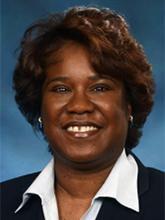From Cells to Communities: Building a Scientist-Survivor Program

Dr. Laundette Jones is Deputy Director of the University of Maryland School of Medicine (UMSOM) Program in Health Equity and Population Health. She is also an Assistant Professor in the Departments of Epidemiology and Public Health and Pharmacology. Dr. Jones is a biosocial researcher with broad training and expertise in the basic biomedical sciences and community and population health. For over 15 years, Dr. Jones led a research laboratory utilizing cell culture and animal models to identify genetic and environmental risk factors for breast cancer. She received international recognition for her contributions towards understanding of the relationship between BRCA1 mutations, sex hormone levels, and cancer risk. Her recent completion of the M.P.H. degree has uniquely positioned Dr. Jones to build transdisciplinary research teams (from basic scientists, clinicians, public health experts, to communities) that seek to address cancer health disparities through the understanding of the interplay of biological, environmental, and social factors. Currently, her research program utilizes a participatory health research approach to create community-academic partnerships that share and co-generate knowledge to produce comprehensive, context-specific strategies for eliminating cancer health disparities.
Dr. Jones’ current professional activities also include key leadership roles in training, education and outreach. She is the Associate Director for the Science Training for Advancing biomedical Research Post-baccalaureate Research Education Program (STAR-PREP). This NIGMS-funded mentored research training program is designed to encourage and prepare recent baccalaureate graduates, coming from underrepresented groups in the biomedical sciences, for successful entry into Ph.D. or M.D./Ph.D. programs. Dr. Jones also serves as the Associate Director of Community and Social Impact for the Center for Epigenetic Research in Child Health and Brain Development (CERCH) at UMSOM. In this role, she provides expertise in building trusting community-academic partnerships, including helping to coordinate, develop, and maintain research infrastructure to enable community participation and developing research protocols that work effectively in community settings.